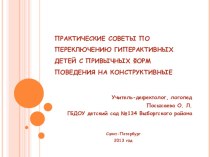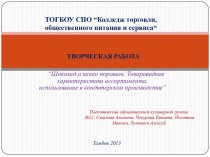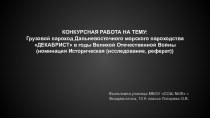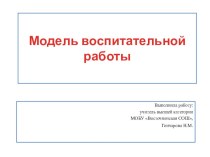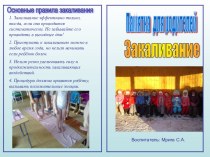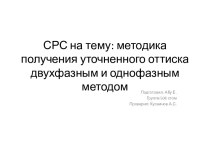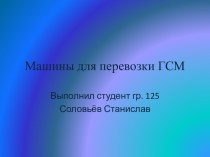- Главная
- Разное
- Бизнес и предпринимательство
- Образование
- Развлечения
- Государство
- Спорт
- Графика
- Культурология
- Еда и кулинария
- Лингвистика
- Религиоведение
- Черчение
- Физкультура
- ИЗО
- Психология
- Социология
- Английский язык
- Астрономия
- Алгебра
- Биология
- География
- Геометрия
- Детские презентации
- Информатика
- История
- Литература
- Маркетинг
- Математика
- Медицина
- Менеджмент
- Музыка
- МХК
- Немецкий язык
- ОБЖ
- Обществознание
- Окружающий мир
- Педагогика
- Русский язык
- Технология
- Физика
- Философия
- Химия
- Шаблоны, картинки для презентаций
- Экология
- Экономика
- Юриспруденция
Что такое findslide.org?
FindSlide.org - это сайт презентаций, докладов, шаблонов в формате PowerPoint.
Обратная связь
Email: Нажмите что бы посмотреть
Презентация на тему Mobile optimizations
Содержание
- 2. Mobile Optimizations
- 3. Corey JohnsonProduct Manager of Doom
- 4. Arm you with more possibilities for optimizations that you will be able to utilizeGoal
- 5. AgendaRecognizing Your Performance BottleneckProfiling in and out of UnityOptimizing Tips
- 6. What do we mean, Performance?FrametimeCPU usage (Gamecode,
- 7. Know Your BottlenecksQuestion: Why are we slow?
- 8. Know Your BottlenecksQuestion: Why are we slow?CPU or GPU Bound?Physics or Rendering?Update() or FixedUpdate() loop?
- 9. Know Your BottlenecksAnswer: Always start in the same place...ProfileProfileProfile
- 10. CPU-Heavy TasksPhysicsAnimation Gameplay code Runtime GI Reflection probes ParticlesCreating Batches
- 11. GPU-Heavy TasksSwitching BatchesGeometry/Pixel shadersCompute shadersSkinning
- 12. Profiling in UnityUnity ProfilerIn-EditorLive Builds on devicesRapid
- 13. Custom Profiler TagsDo this:Get This:
- 14. Unity Memory ProfilerOpen Source https://bitbucket.org/Unity-Technologies/memoryprofiler Profile memory
- 15. Profiling outside of Unity (iOS)InstrumentsProfile game running
- 16. Profiling outside of Unity (Android)Unity ProfileradblogcatGPUAdreno (Qualcomm)PVRTune, PVRUniSCo (PowerVR)Intel GPA
- 17. Garbage CollectionManaged MemorySize doubles when limit is
- 18. Garbage Collection - Stack vs HeapHeap ObjectsMemory
- 19. Data Layout Mattersstruct Stuff {int a;float b;bool c;string name;}Stuff[] arrayOfStuff; //
- 20. Object PoolingCreate a pool of objects to
- 21. Use System.Text.StringBuilder over stringstring str = “1
- 22. More Memory OptimizationsReuse temporary buffersIf buffers for
- 23. Other GC Optimizationsfor(;;) instead of foreachforeach on
- 24. Marshalling CostYou can write native pluginsCan be
- 25. Case Study - CachingGetting 20k matrices which
- 26. Case Study - CachingCache complex expressionsProperties can hide expensive operationsOptimized implementation: 33.5ms
- 27. Case study - CopyingCreate a method using
- 28. Optimizing GraphicsBake what can be bakedLightingShadowsBatch what can be batchedStatic MeshesMaterialsUI Canvas elements
- 29. Optimizing MeshesOnly use as many vertices as
- 30. Optimizing MeshesDisable “Import Blend Shapes” if none
- 31. Combine Meshes
- 32. Combine TexturesTexture Atlases can be made by artists too…
- 33. Optimizing TexturesiOS - Use PVRTCAndroidOpenGLES 2.0 devices:
- 34. Optimizing Textures - ExampleShadowgunUsed “Render to Texel”
- 35. Optimizing Textures - Example
- 36. Optimizing Audio“Force to Mono” if sounds don’t
- 37. Optimizing UIKeep UI elements at the same
- 38. Other OptimizationsLimiting Rigidbodies to 2 dimensions in
- 39. Script OptimizationsAvoid Find…() methodsCache a reference insteadFindWithTag()
- 40. Vector Math OptimizationsNormalize a vector once if
- 41. Shader OptimizationIn general, less instructions is better*Move
- 42. 10000 Objects Update() vs Update() 10000 ObjectsBlog
- 43. Скачать презентацию
- 44. Похожие презентации
Mobile Optimizations




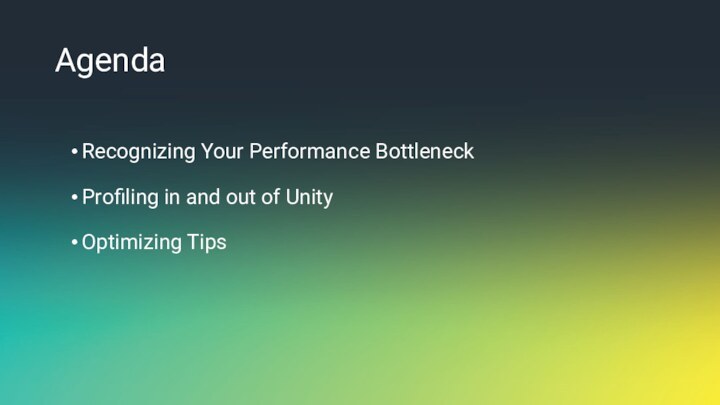
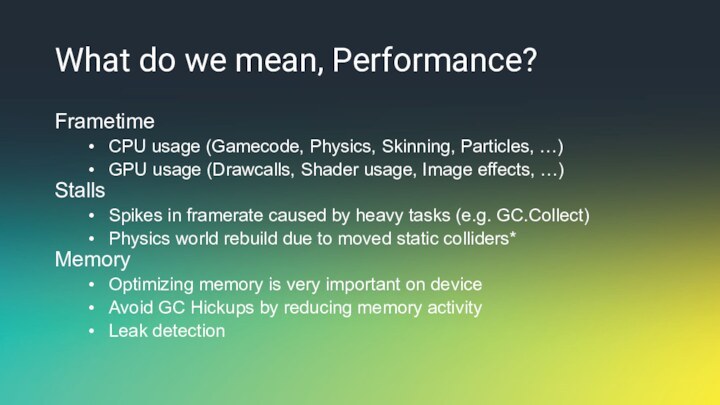
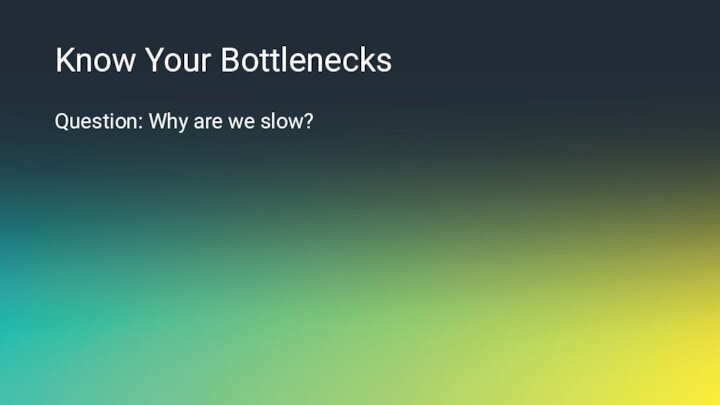
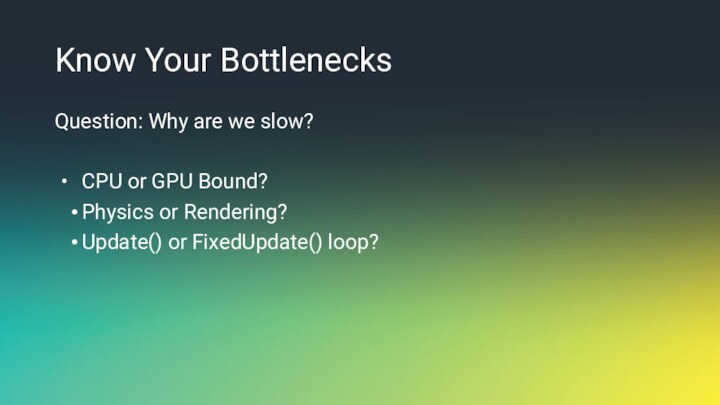
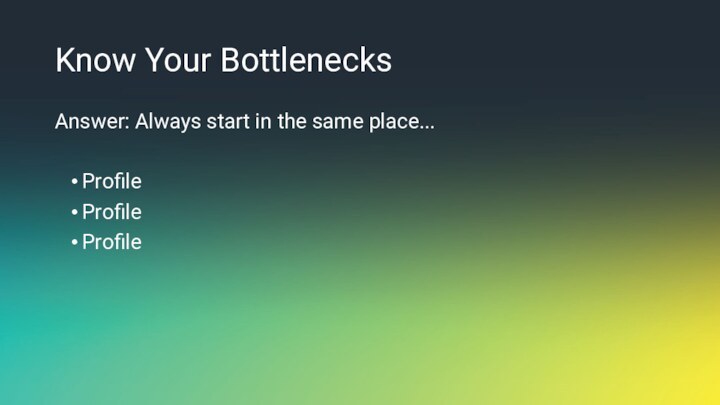
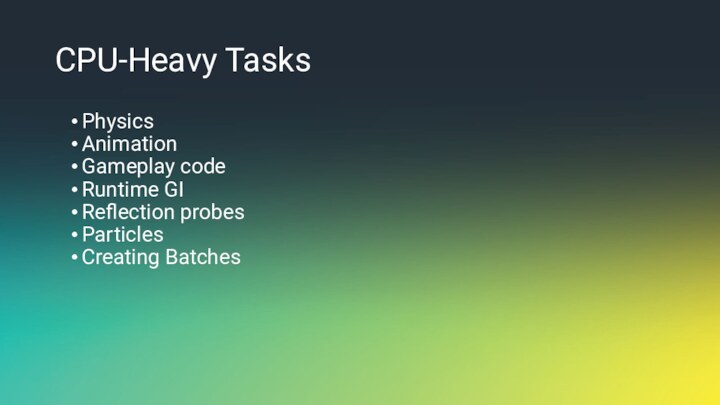
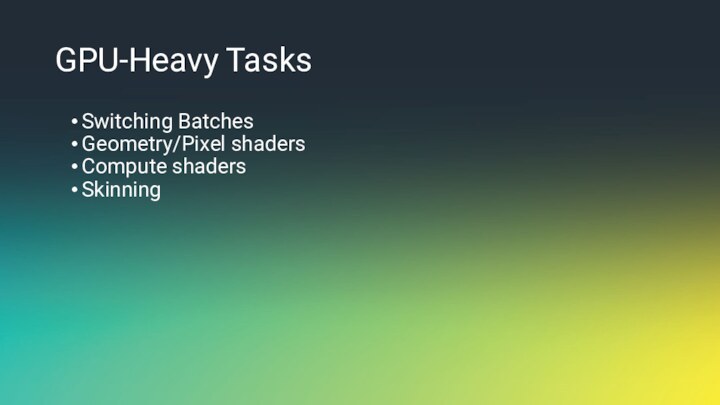
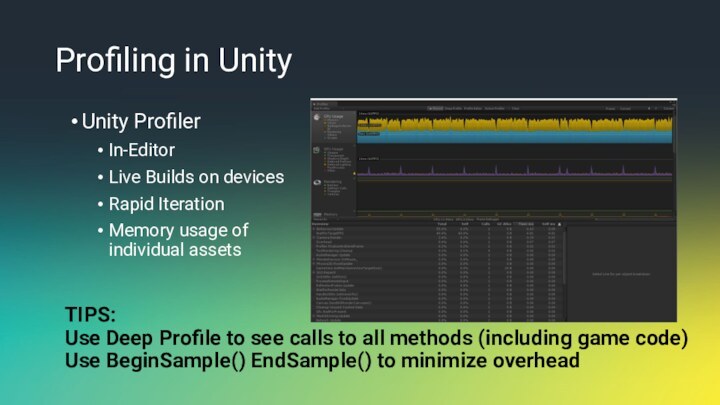
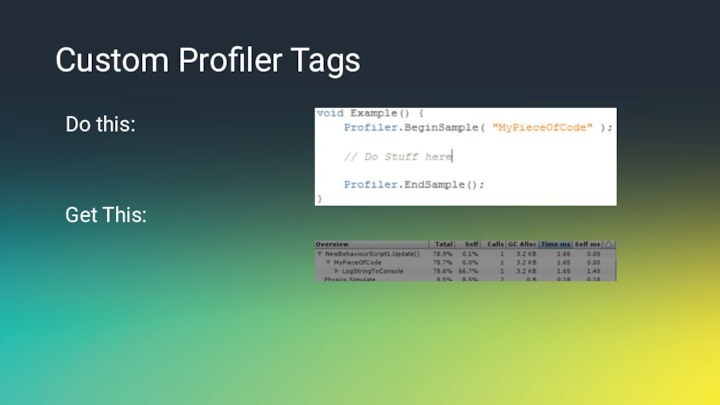
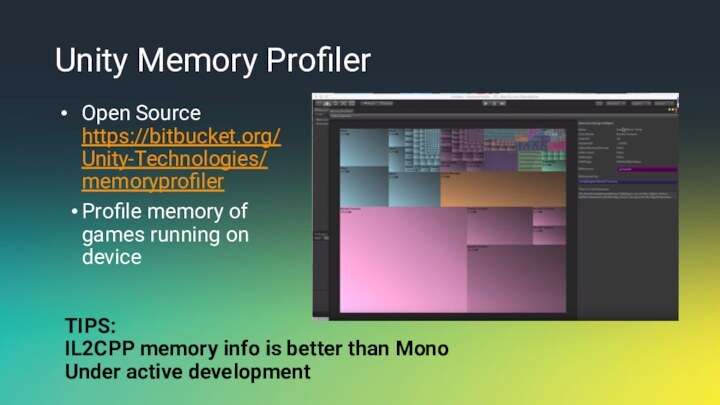
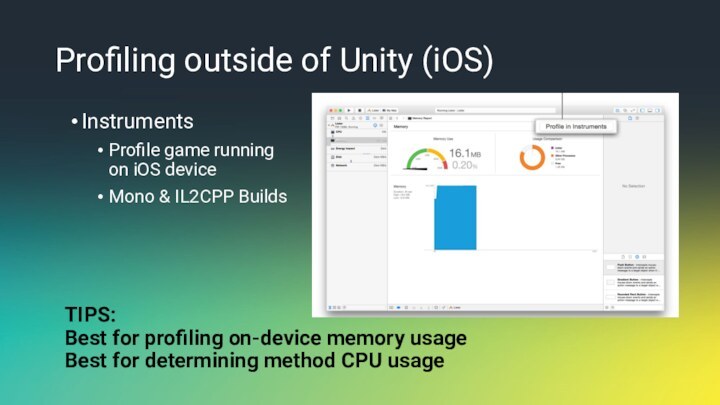
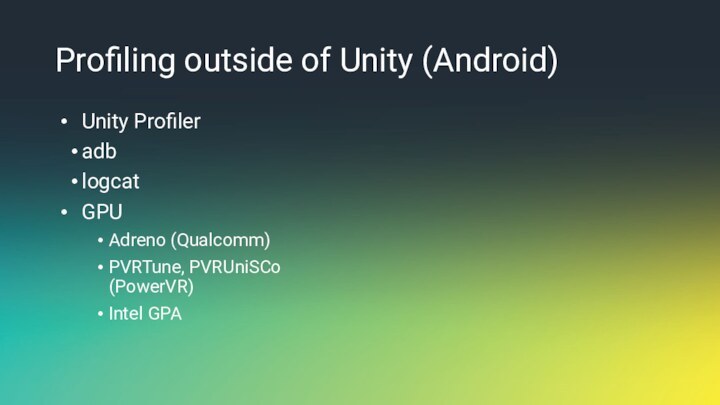
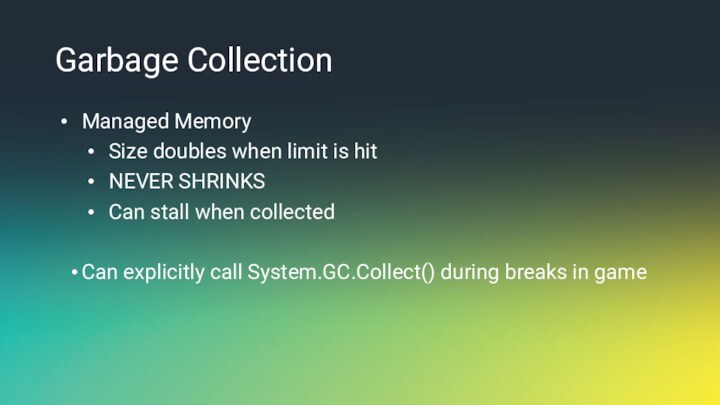
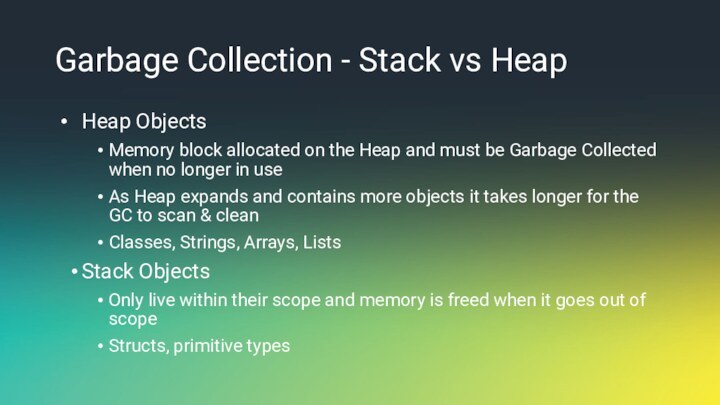
![Mobile optimizations Data Layout Mattersstruct Stuff {int a;float b;bool c;string name;}Stuff[] arrayOfStuff; //](/img/tmb/14/1393724/f684a2a8cd1740f63cb622a7dae6053c-720x.jpg)
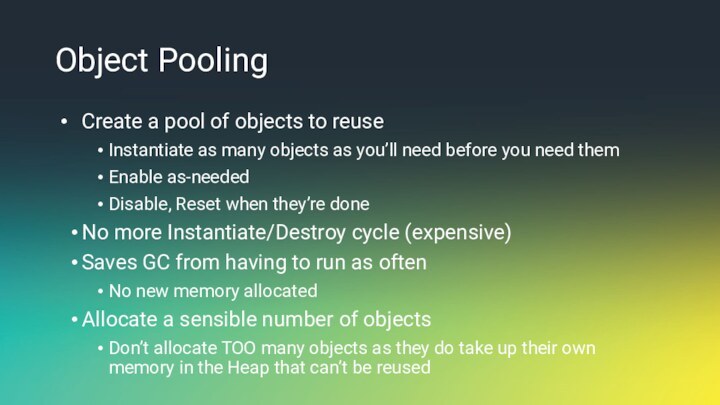
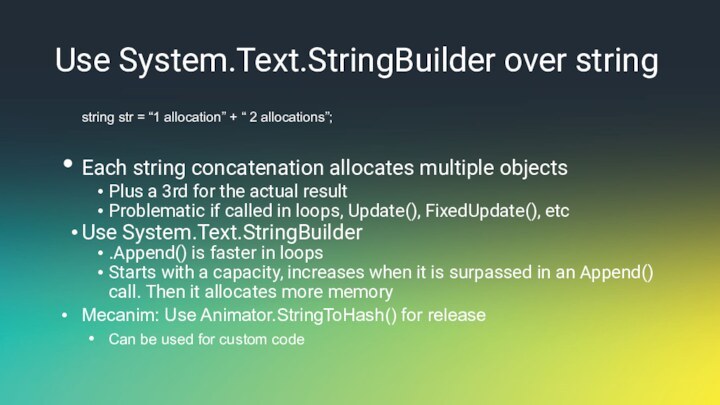
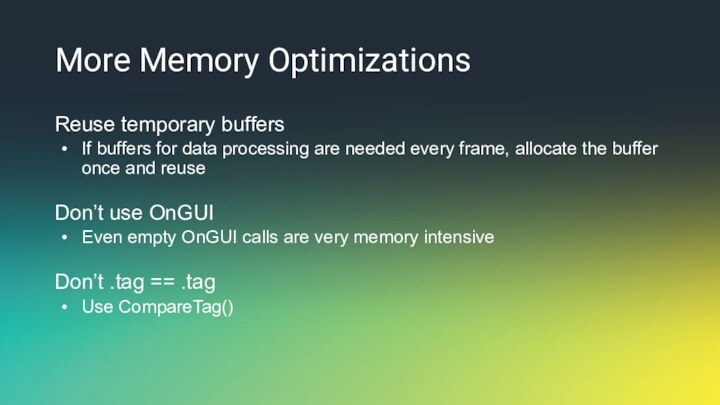
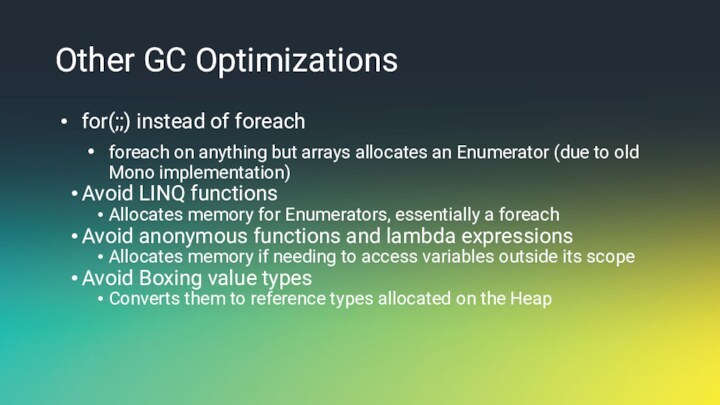
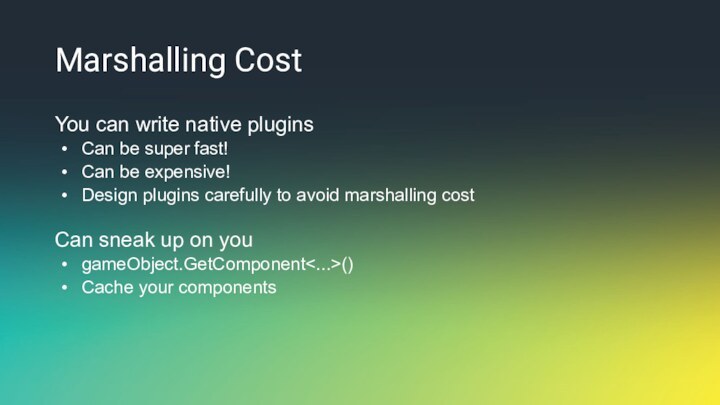
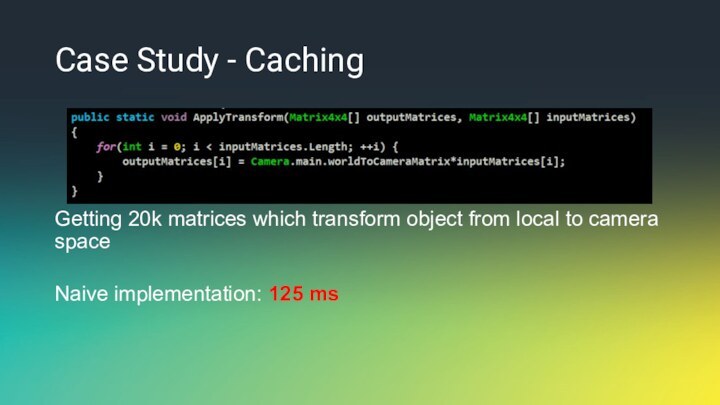
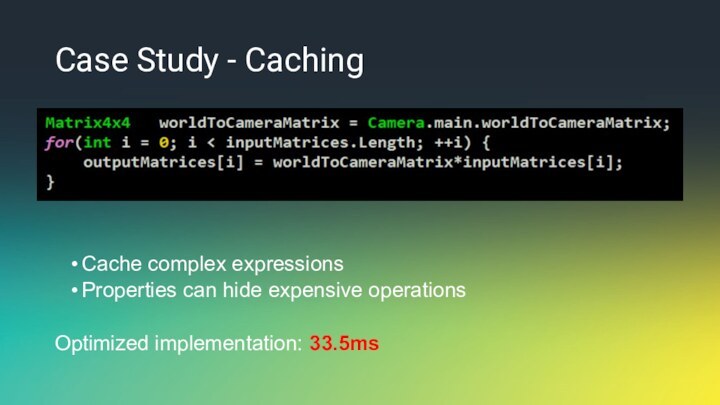
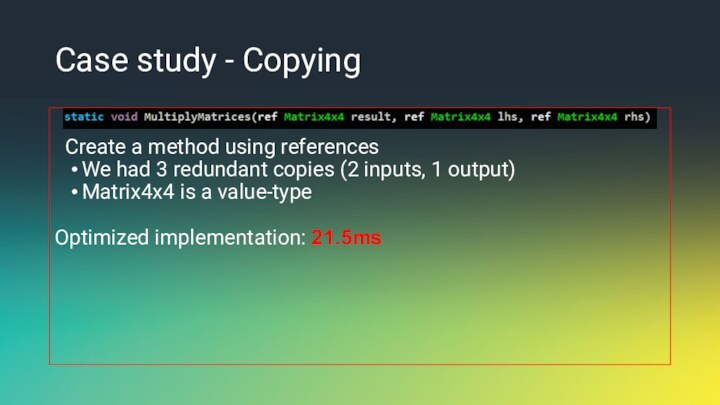
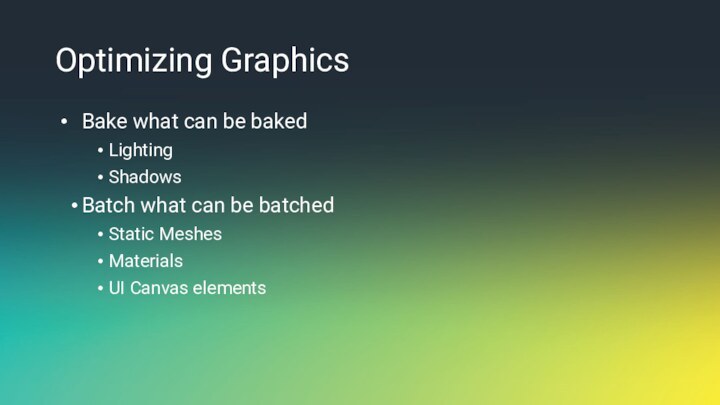
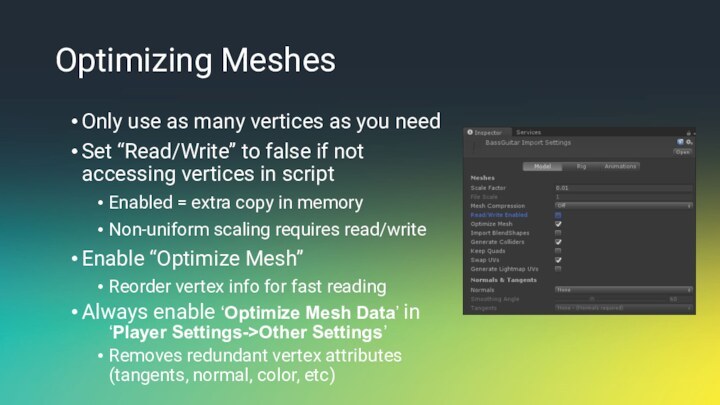
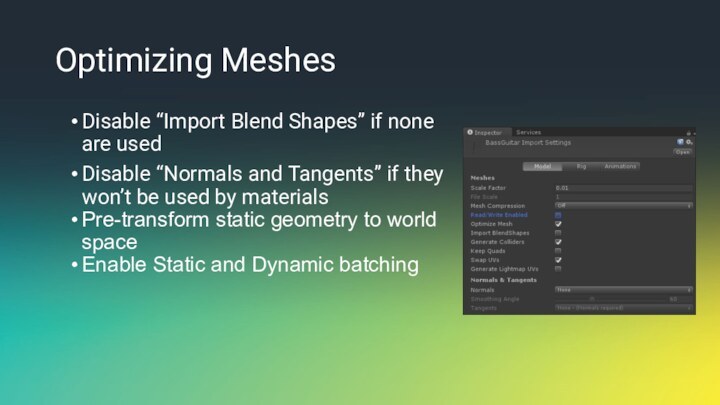
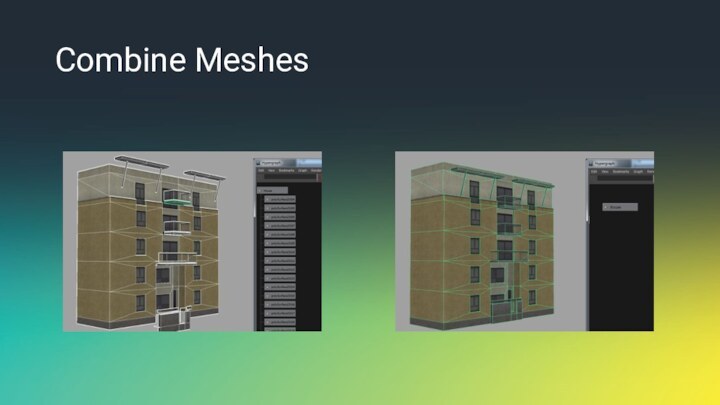
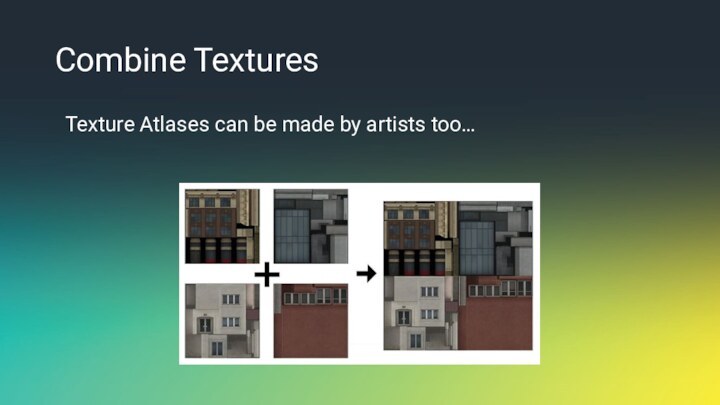
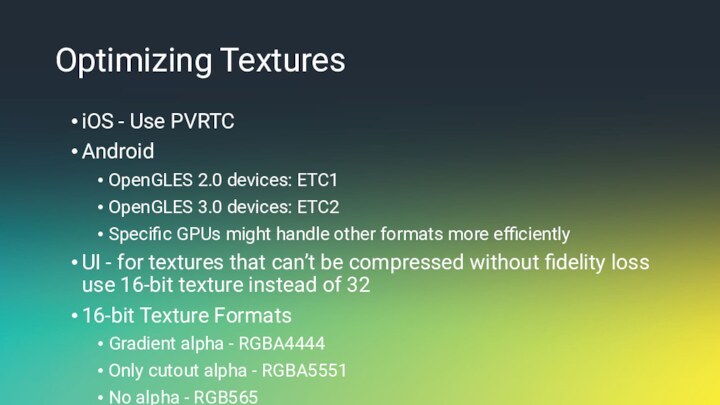
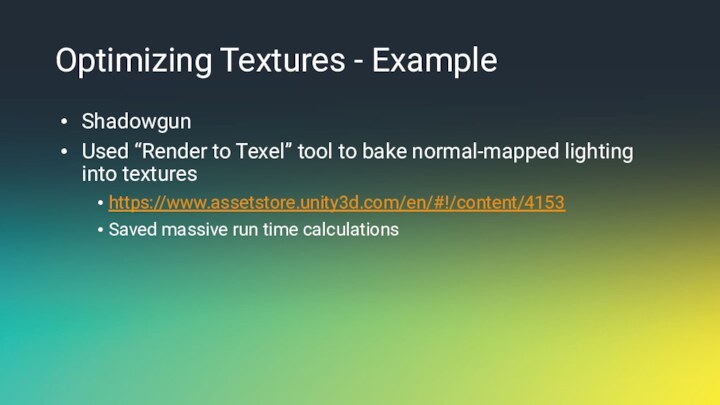
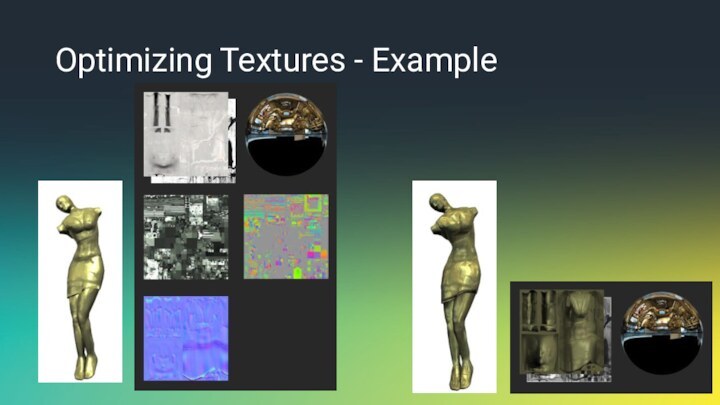
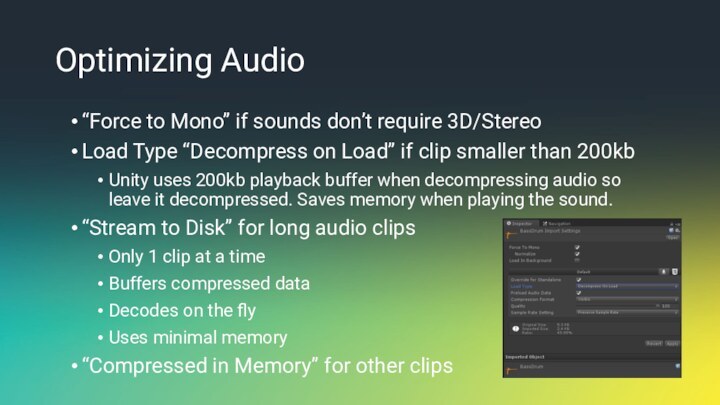
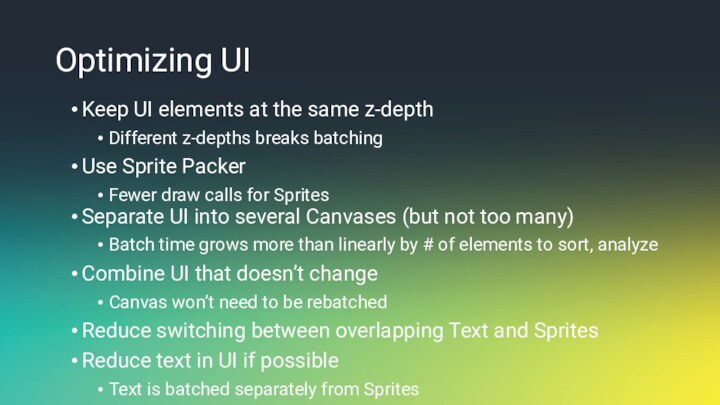
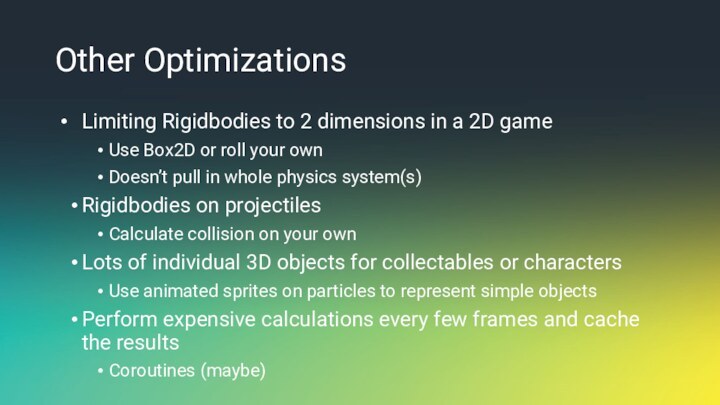
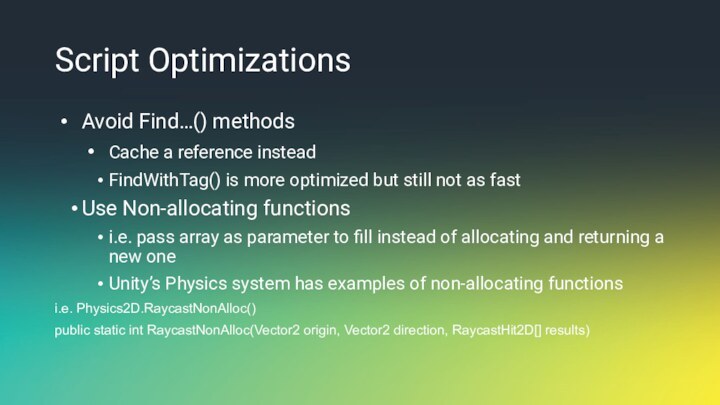
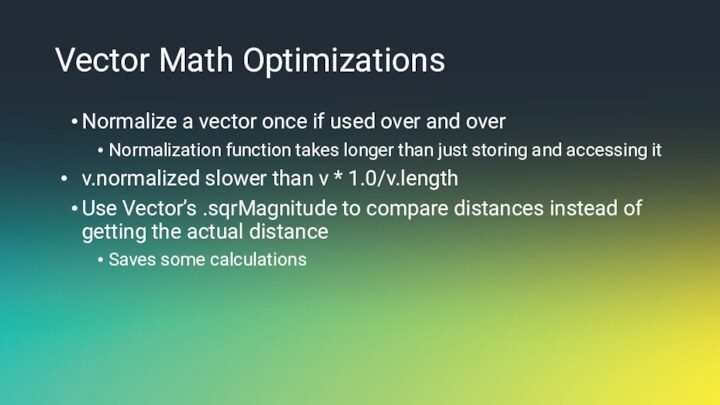
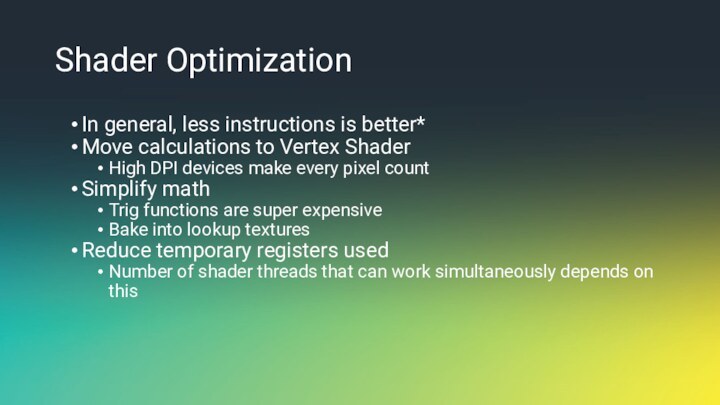
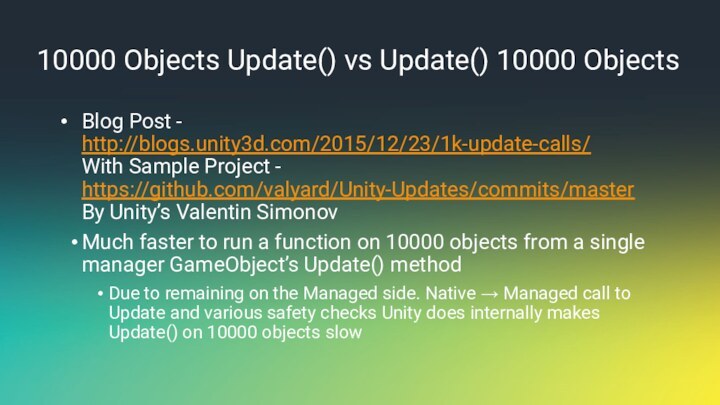
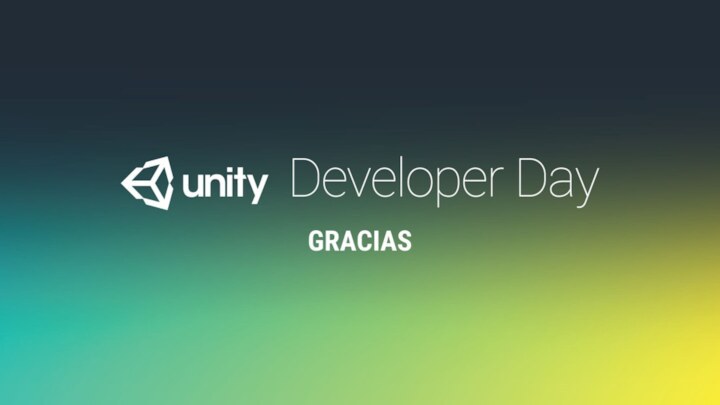
Слайд 6
What do we mean, Performance?
Frametime
CPU usage (Gamecode, Physics,
Skinning, Particles, …)
GPU usage (Drawcalls, Shader usage, Image effects,
…)Stalls
Spikes in framerate caused by heavy tasks (e.g. GC.Collect)
Physics world rebuild due to moved static colliders*
Memory
Optimizing memory is very important on device
Avoid GC Hickups by reducing memory activity
Leak detection
Слайд 8
Know Your Bottlenecks
Question: Why are we slow?
CPU or
GPU Bound?
Physics or Rendering?
Update() or FixedUpdate() loop?
Слайд 10
CPU-Heavy Tasks
Physics
Animation
Gameplay code
Runtime GI
Reflection probes
Particles
Creating Batches
Слайд 12
Profiling in Unity
Unity Profiler
In-Editor
Live Builds on devices
Rapid Iteration
Memory
usage of
individual assets
TIPS:
Use Deep Profile to see
calls to all methods (including game code)
Use BeginSample() EndSample() to minimize overhead
Слайд 14
Unity Memory Profiler
Open Source
https://bitbucket.org/Unity-Technologies/memoryprofiler
Profile memory of games
running on device
TIPS:
IL2CPP memory info is better than
Mono
Under active development
Слайд 15
Profiling outside of Unity (iOS)
Instruments
Profile game running
on iOS
device
Mono & IL2CPP Builds
TIPS:
Best for profiling on-device memory
usage
Best for determining method CPU usage
Слайд 16
Profiling outside of Unity (Android)
Unity Profiler
adb
logcat
GPU
Adreno (Qualcomm)
PVRTune, PVRUniSCo
(PowerVR)
Intel
Слайд 17
Garbage Collection
Managed Memory
Size doubles when limit is hit
NEVER
SHRINKS
Can stall when collected
Can explicitly call System.GC.Collect() during breaks
in game
Слайд 18
Garbage Collection - Stack vs Heap
Heap Objects
Memory block
allocated on the Heap and must be Garbage Collected
when no longer in useAs Heap expands and contains more objects it takes longer for the GC to scan & clean
Classes, Strings, Arrays, Lists
Stack Objects
Only live within their scope and memory is freed when it goes out of scope
Structs, primitive types
Слайд 19
Data Layout Matters
struct Stuff {
int a;
float b;
bool c;
string
name;
}
Stuff[] arrayOfStuff; //
As;float[] Bs;
bool[] Cs;
string[] names; //<< Only this is scanned. GC takes less time.
Слайд 20
Object Pooling
Create a pool of objects to reuse
Instantiate
as many objects as you’ll need before you need
themEnable as-needed
Disable, Reset when they’re done
No more Instantiate/Destroy cycle (expensive)
Saves GC from having to run as often
No new memory allocated
Allocate a sensible number of objects
Don’t allocate TOO many objects as they do take up their own memory in the Heap that can’t be reused
Слайд 21
Use System.Text.StringBuilder over string
string str = “1 allocation”
+ “ 2 allocations”;
Each string concatenation allocates multiple objects
Plus
a 3rd for the actual resultProblematic if called in loops, Update(), FixedUpdate(), etc
Use System.Text.StringBuilder
.Append() is faster in loops
Starts with a capacity, increases when it is surpassed in an Append() call. Then it allocates more memory
Mecanim: Use Animator.StringToHash() for release
Can be used for custom code
Слайд 22
More Memory Optimizations
Reuse temporary buffers
If buffers for data
processing are needed every frame, allocate the buffer once
and reuseDon’t use OnGUI
Even empty OnGUI calls are very memory intensive
Don’t .tag == .tag
Use CompareTag()
Слайд 23
Other GC Optimizations
for(;;) instead of foreach
foreach on anything
but arrays allocates an Enumerator (due to old Mono
implementation)Avoid LINQ functions
Allocates memory for Enumerators, essentially a foreach
Avoid anonymous functions and lambda expressions
Allocates memory if needing to access variables outside its scope
Avoid Boxing value types
Converts them to reference types allocated on the Heap
Слайд 24
Marshalling Cost
You can write native plugins
Can be super
fast!
Can be expensive!
Design plugins carefully to avoid marshalling cost
Can
sneak up on yougameObject.GetComponent<...>()
Cache your components
Слайд 25
Case Study - Caching
Getting 20k matrices which transform
object from local to camera space
Naive implementation: 125 ms
Слайд 26
Case Study - Caching
Cache complex expressions
Properties can hide
expensive operations
Optimized implementation: 33.5ms
Слайд 27
Case study - Copying
Create a method using references
We
had 3 redundant copies (2 inputs, 1 output)
Matrix4x4 is
a value-typeOptimized implementation: 21.5ms
Слайд 28
Optimizing Graphics
Bake what can be baked
Lighting
Shadows
Batch what can
be batched
Static Meshes
Materials
UI Canvas elements
Слайд 29
Optimizing Meshes
Only use as many vertices as you
need
Set “Read/Write” to false if not
accessing vertices in
scriptEnabled = extra copy in memory
Non-uniform scaling requires read/write
Enable “Optimize Mesh”
Reorder vertex info for fast reading
Always enable ‘Optimize Mesh Data’ in ‘Player Settings->Other Settings’
Removes redundant vertex attributes (tangents, normal, color, etc)
Слайд 30
Optimizing Meshes
Disable “Import Blend Shapes” if none are
used
Disable “Normals and Tangents” if they won’t be used
by materialsPre-transform static geometry to world space
Enable Static and Dynamic batching
Слайд 33
Optimizing Textures
iOS - Use PVRTC
Android
OpenGLES 2.0 devices: ETC1
OpenGLES
3.0 devices: ETC2
Specific GPUs might handle other formats more
efficientlyUI - for textures that can’t be compressed without fidelity loss use 16-bit texture instead of 32
16-bit Texture Formats
Gradient alpha - RGBA4444
Only cutout alpha - RGBA5551
No alpha - RGB565
Слайд 34
Optimizing Textures - Example
Shadowgun
Used “Render to Texel” tool
to bake normal-mapped lighting into textures
https://www.assetstore.unity3d.com/en/#!/content/4153
Saved massive run
time calculations
Слайд 36
Optimizing Audio
“Force to Mono” if sounds don’t require
3D/Stereo
Load Type “Decompress on Load” if clip smaller than
200kbUnity uses 200kb playback buffer when decompressing audio so leave it decompressed. Saves memory when playing the sound.
“Stream to Disk” for long audio clips
Only 1 clip at a time
Buffers compressed data
Decodes on the fly
Uses minimal memory
“Compressed in Memory” for other clips
Слайд 37
Optimizing UI
Keep UI elements at the same z-depth
Different
z-depths breaks batching
Use Sprite Packer
Fewer draw calls for Sprites
Separate
UI into several Canvases (but not too many)Batch time grows more than linearly by # of elements to sort, analyze
Combine UI that doesn’t change
Canvas won’t need to be rebatched
Reduce switching between overlapping Text and Sprites
Reduce text in UI if possible
Text is batched separately from Sprites
Слайд 38
Other Optimizations
Limiting Rigidbodies to 2 dimensions in a
2D game
Use Box2D or roll your own
Doesn’t pull in
whole physics system(s)Rigidbodies on projectiles
Calculate collision on your own
Lots of individual 3D objects for collectables or characters
Use animated sprites on particles to represent simple objects
Perform expensive calculations every few frames and cache the results
Coroutines (maybe)
Слайд 39
Script Optimizations
Avoid Find…() methods
Cache a reference instead
FindWithTag() is
more optimized but still not as fast
Use Non-allocating functions
i.e.
pass array as parameter to fill instead of allocating and returning a new oneUnity’s Physics system has examples of non-allocating functions
i.e. Physics2D.RaycastNonAlloc()
public static int RaycastNonAlloc(Vector2 origin, Vector2 direction, RaycastHit2D[] results)
Слайд 40
Vector Math Optimizations
Normalize a vector once if used
over and over
Normalization function takes longer than just storing
and accessing itv.normalized slower than v * 1.0/v.length
Use Vector’s .sqrMagnitude to compare distances instead of getting the actual distance
Saves some calculations
Слайд 41
Shader Optimization
In general, less instructions is better*
Move calculations
to Vertex Shader
High DPI devices make every pixel count
Simplify
mathTrig functions are super expensive
Bake into lookup textures
Reduce temporary registers used
Number of shader threads that can work simultaneously depends on this
Слайд 42
10000 Objects Update() vs Update() 10000 Objects
Blog Post
- http://blogs.unity3d.com/2015/12/23/1k-update-calls/ With Sample Project - https://github.com/valyard/Unity-Updates/commits/master By Unity’s Valentin
SimonovMuch faster to run a function on 10000 objects from a single manager GameObject’s Update() method
Due to remaining on the Managed side. Native → Managed call to Update and various safety checks Unity does internally makes Update() on 10000 objects slow




